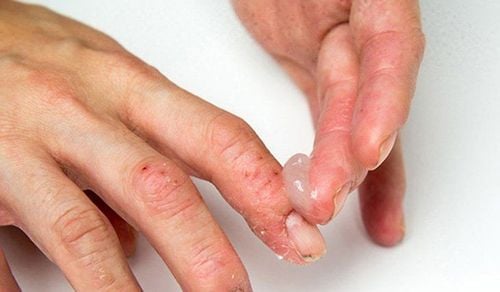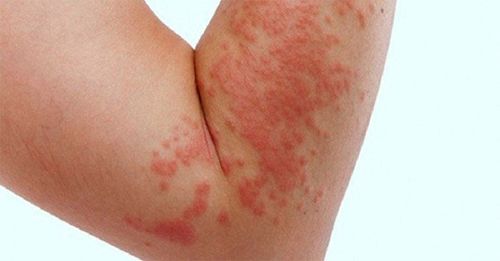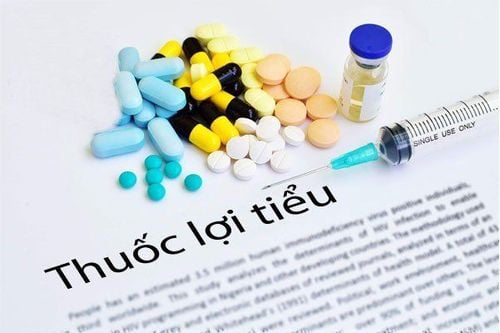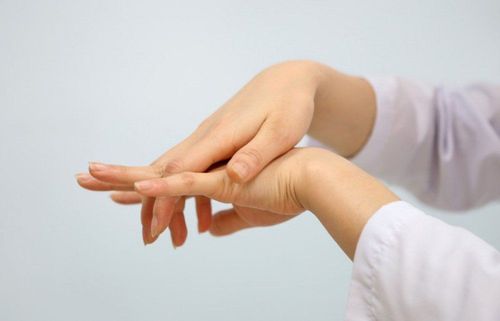This is an automatically translated article.
Betadine Ointment is a multipurpose antiseptic used to treat and prevent skin infections. Medicines containing iodine work to kill and stop the growth of bacteria that cause infection, thus helping to prevent scratches, cuts, or any other skin wound from becoming infected.1. Uses of Betadine Ointment
Betadine ointment is an antiseptic applied to infected or potentially infected skin. It works by slowly releasing iodine to kill or stop the growth of infectious microorganisms.
Topical betadine is indicated for the topical treatment or prevention of infections in minor cuts and abrasions, minor surgical procedures and minor burns, for the treatment of fungal and bacterial skin infections, Treatment of infections in ulcers caused by pus and pus stasis.
The medicine is for external use only for the treatment of infections, apply it 1-2 times daily for up to 14 days.
2. Contraindications of Betadine ointment
You need to be careful with contraindications when using Betadine ointment
Hypersensitivity to iodine or povidone or any of the excipients. History of abnormal thyroid function (hyperthyroidism) or goiter, other obvious thyroid pathologies such as colloid nodules, local goiter, Hashimoto's thyroiditis, as well as before and after iodine therapy radiation. Patients with goiter, thyroid tumor or other thyroid disease (especially the elderly) are at risk of hyperthyroidism (hyperthyroidism) if high doses of iodine are used. Children under 2 years The patient is being treated with lithium.

Betadine Ointment là một chất khử trùng đa năng được sử dụng để điều trị và ngăn ngừa nhiễm trùng trên da.
3. How to use Betadine ointment
Use the medicine according to the instructions of the treating doctor. The area where the medication is to be applied must be washed and allowed to dry before applying the medication. The drug should be used regularly to get the most out of it. However, do not use more than necessary, as this will not make the condition improve faster and conversely some side effects may increase. If the condition persists for more than four weeks or gets worse at any time, let your doctor know. For this medicine to work better, always keep the affected skin areas clean, make sure they are dry, and wash your hands before and after treating the infection.
4. Notes when using Betadine
Use of this preparation may interfere with thyroid function tests. Iodine is absorbed through burns and injured skin to a lesser extent through intact skin and can lead to toxic levels of iodine in the blood, particularly in patients with renal failure. If you notice symptoms that indicate changes in thyroid function, see your doctor right away. In patients with functional renal failure, blood iodine levels should be regularly monitored.
The drug may cause side effects such as skin irritation, redness or itching at the application site. Please consult your doctor if these side effects occur in the long term. Avoid direct contact with eyes. In case of direct contact, rinse eyes with clean water and seek medical attention immediately. You should stop taking it immediately if you have any signs of an allergic reaction. Signs of this condition include a rash, swelling of the lips, throat, or face, trouble swallowing or breathing, feeling dizzy or faint, and nausea.
Betadine Ointment can permanently discolor white gold jewelry so it is recommended that you store this jewelry before using Betadine.

Thuốc có thể gây ra các tác dụng phụ như kích ứng da, mẩn đỏ hoặc ngứa tại vị trí bôi thuốc
5. Undesirable effects of Betadine ointment
Rare side effects: skin hypersensitivity reactions (eg, delayed allergic reaction to contact, appearing as itching, redness, small blisters or similar symptoms). In isolated cases of acute, systemic allergic reactions including hypotension and/or shortness of breath (hypersensitivity reactions) have been reported.
Prolonged use of the drug in the treatment of wounds and burns on large areas of the skin can cause significant absorption of iodine. In patients with a history of thyroid disease, hyperthyroidism may occur (iodine-induced hyperthyroidism), sometimes with symptoms such as tachycardia or restlessness.
6. Using drugs for pregnant and lactating women
Betadine Ointment may not be safe to use during pregnancy. Animal studies have shown harmful effects on the developing fetus.
Ointment is safe to use during lactation. Human studies show that the drug does not pass into breast milk in significant amounts and is unlikely to harm the baby.

Phụ nữ mang thai không nên dùng thuốc khi chưa có sự chỉ định của bác sĩ
7. What to do if Betadine overdose?
Intentional or accidental ingestion of large amounts of povidone iodine will result in high iodine levels in the blood and erosion of the gastrointestinal tract causing symptoms such as vomiting, diarrhea and abdominal pain. Systemic toxicity may lead to shock, hypotension, tachycardia, fever, metabolic acidosis, and renal failure. Symptomatic and supportive therapy should be initiated with monitoring of electrolyte balance, renal function and liver function. Iodine-removal hemodialysis is an effective way and should be used in cases of severe iodine poisoning, especially if the patient currently has renal failure. Continuous intravenous hemodialysis is less effective than hemodialysis.
The above is important information about Betadine, but before using it, patients should consult a doctor, pharmacist for appropriate and safe indications. The use of drugs for the right purpose always brings high efficiency and cost savings for the treatment process.
Please dial HOTLINE for more information or register for an appointment HERE. Download MyVinmec app to make appointments faster and to manage your bookings easily.
Reference source: drugs.com












